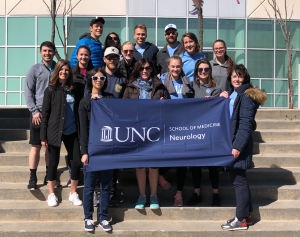Walk MS: Raleigh 2019 connects a community of liked-minded individuals to fundraise to change the world for people who are affected by multiple sclerosis, a debilitating disease of the nervous system that can be difficult to treat. This year, several Doctor of Physical Therapy (DPT) students fundraised and participated in the one-and-three mile walking route, held in late March.

Second-year student Amy Collins planned and organized this year’s team from the Division of Physical Therapy. The division is housed in the UNC School of Medicine Department of Allied Health Sciences.
“I have a family history of MS and work with several members of the local North Carolina community who have MS. I walk for them,” Collins said. “It’s a great fundraising event that raises money for MS research, for supporting persons with MS, and for advocating for people affected by MS.”
Collins is an MS Standardized Treatment and Education Program with University Partners (MS STEP UP) scholar, which means she is given the opportunity to participate in MS-specific learning modules, research, advocacy/fundraising events, shadowing opportunities, clinical rotations, and continuing education. The MS STEP UP program launched in 2008 and has produced nearly 20 physical therapists trained in issues patients face that stem from the disease, such as with gait, balance, and other mobility issues. It is the brainchild of Angela and Marty Rosenberg, who recently endowed the program to ensure its success for years to come.
“The MS STEP UP scholar program provides me with this ability to learn and experience more work with patients diagnosed with MS than I would otherwise have,” said Collins. “This program challenges me to further my education and to make a difference beyond simply going through the semester classes of PT school.”
Collins said physical therapy is an underutilized form of care for patients with MS. As a future physical therapist, Collins wants to help her patients access resources and to learn how to integrate them into their daily lives. Collins also wants to provide her patients with the confidence to believe they are more capable than they realize.
“Persons with MS oftentimes do not realize how many ways they can improve, especially without medications,” said Collins. “Because of the power of neuroplasticity, physical therapy has the ability to increase neural sprouting, strengthen intact receptors, and reroute around damaged nerves with balance-based and mobility interventions.”
Amelia Cain, who is also a Doctor of Physical Therapy student, fundraised for the DPT team.
“Participating in Walk MS is an amazing experience, said Cain. “Not only were we able to be surrounded by other physical therapists and neurologists who work with patients with MS, but with an entire community of people affected by MS who were walking and working together to raise money.”
Cain has worked with many patients with MS and has seen how partnerships with and resources supporting the National MS Society has changed lives.
“Our hope is for a world free of MS,” said Cain. “Until then, there are nearly one million people in the U.S. alone who are living with MS who deserve the best health care and resources available. As a future physical therapist, my goal is to help people with MS optimize their quality of life.”
The division’s team raised more than $3,000; donations can be made to support this year’s team until May 18.